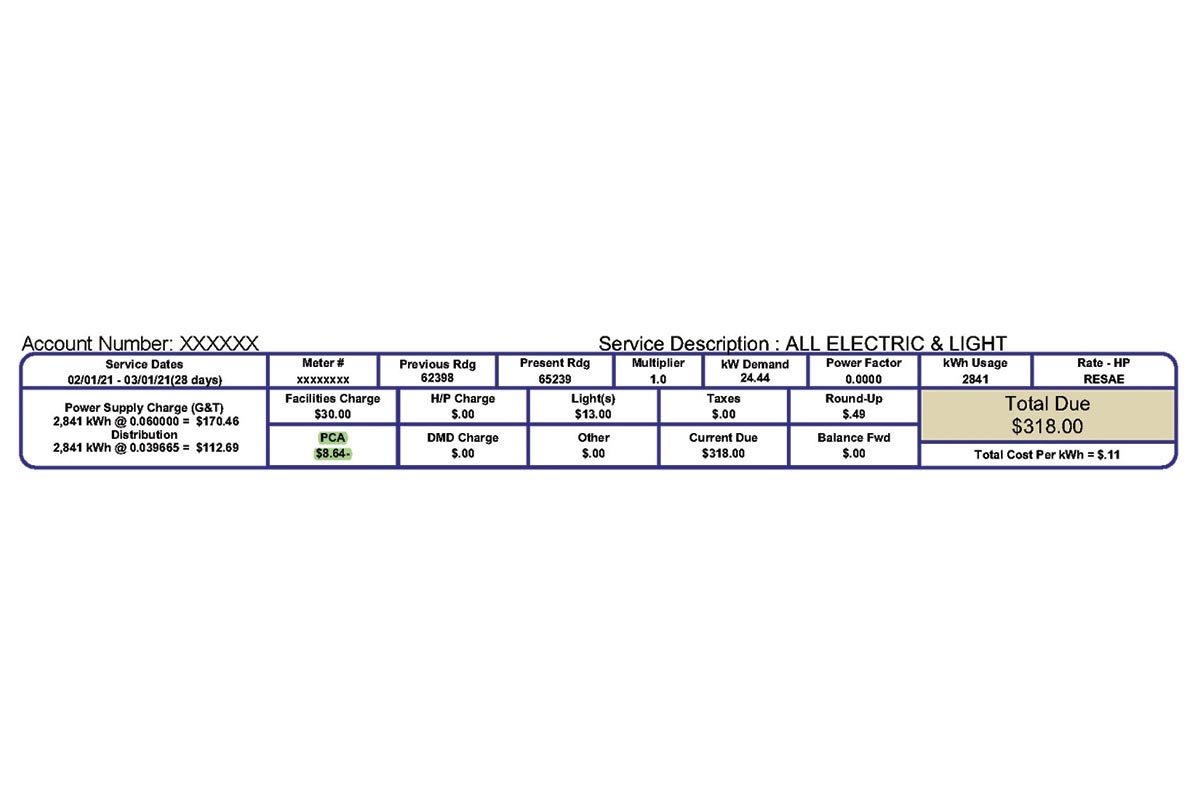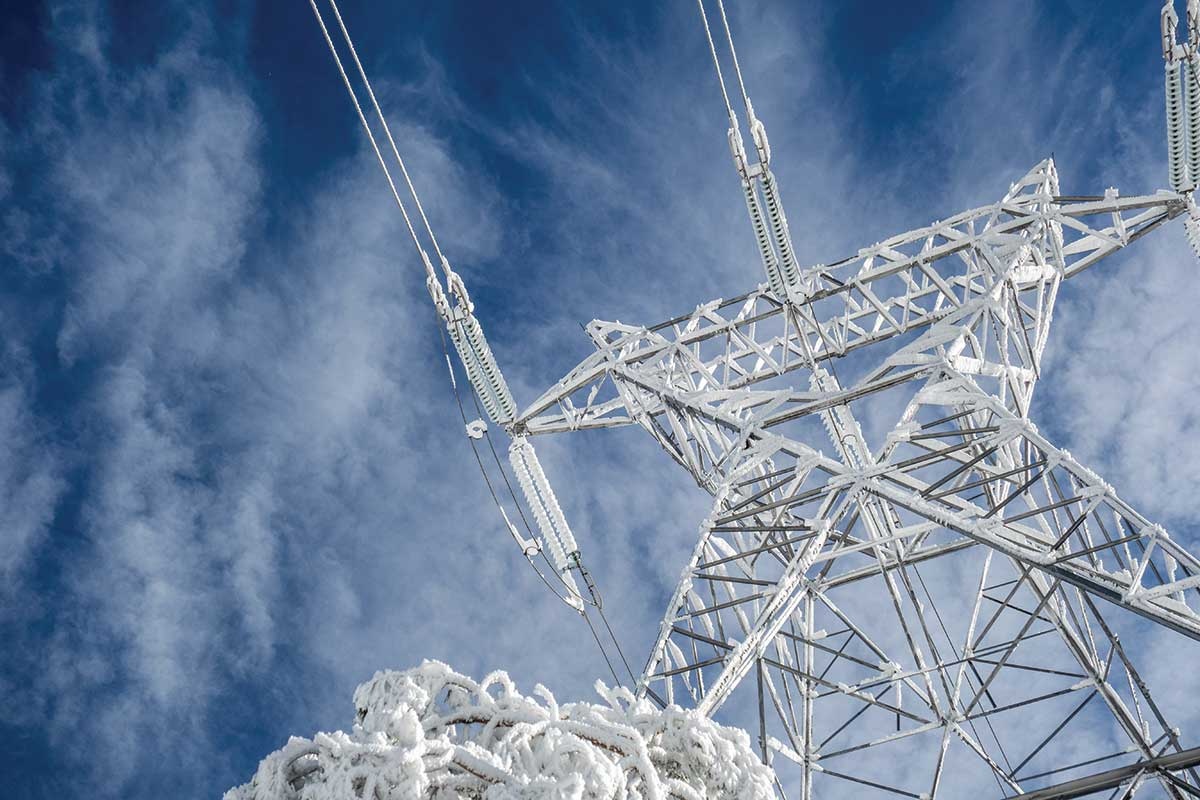The outages caused by mid-February’s polar vortex triggered many questions and fears among Big Country Electric Cooperative members about how electric bills will be affected. This situation is complex and ongoing, and we want to bring you the latest updates.
Financial Impact
The polar vortex and associated storms cost Big Country EC about $17 million. For perspective, our February 2020 power bill was about $1.2 million.
The $17 million total mostly represents the increased cost of fuel necessary for the generation of electricity during the power crisis, but that sizable sum isn’t cause for panic. The co-op’s equity is strong, allowing us to obtain financing to minimize the impact to you, the member-owners. Under the not-for-profit cooperative business model, costs are borne by cooperative member-owners. In return, margins are allocated and returned to cooperative member-owners in the form of capital credits.
You might be wondering how one week could cost $17 million. The polar vortex caused natural gas spot market prices to spike to a level never seen before. Golden Spread Electric Cooperative, our wholesale power provider, purchased gas to cover its member cooperatives’ load in the days leading up to the storm, in anticipation of market fluctuations. But GSEC was forced to pay progressively higher prices for gas to run our power plants during that time.
Natural gas spot markets were near $2.50 per million British thermal units before the bitter cold rolled into Texas. There were reports of that spot market reaching $1,250 per mmBtu during the storm.
In the lower left cell of the bill example below, see the 6-cent-per-kilowatt-hour power supply charge, the average budgeted purchased power cost for energy purchased on our behalf from Golden Spread EC. Of that 6 cents, roughly 2.5 cents is the cost of fuel and energy to generate power. During the polar vortex, the latter component rose to 66.5 cents, making the actual power cost 69 cents per kWh—more than 10 times the typical budgeted cost.
Natural gas wells froze in February, and it’s possible that power outages shut down compressor stations that were pushing gas to GSEC generating facilities. That caused two of our generating facilities, Mustang Station in Denver City and Antelope Elk Energy Center in Abernathy, to stop producing electricity, making the entire GSEC territory, including Big Country EC, susceptible to both the Electric Reliability Council of Texas and Southwest Power Pool market price spikes for several days during and after the vortex.
As mentioned above, natural gas prices remained extremely high throughout this scenario as efforts were made to generate power for you, our members. Although there were periods when our members were without power, when power was on, usage was exceptionally high. During these times the price of fuel for generation and the purchase of expensive electricity from the market when generation was not possible drove costs to unprecedented levels.
How Does This Affect You?
As we shared with you in the March Membergram, BCEC’s kilowatt-hour tariff rates are fixed. We will not and cannot change rates without giving members proper notice, and plans to change rates because of the winter storm, grid-mandated outages or any other reason are not in the works.
Beginning with your April bill, you will notice the power cost adjustment credit has been reduced to $0.00 per kWh. For a service location such as a home or barn that used 2,800 kWh in February, that will result in an increase of about $8 to your bill. Please see the example below.

This is a first step in repaying BCEC’s share of the increased cost of fuel generation and the purchase of electricity through GSEC.
The power cost adjustment that you see on your bill varies somewhat under normal circumstances due to the changing cost of fuel for generation. If the price of natural gas is very low, making electricity less expensive to generate than our average budgeted purchased power cost of 6 cents per kWh, then the power cost adjustment is a credit, which reduces your total bill. However, if natural gas prices rise, as we saw in February, this makes electricity more expensive to generate, which either reduces that credit or potentially changes it to a fee assessed per kilowatt-hour.
We analyze the power cost adjustment monthly and make every effort to level it. BCEC will continue to monitor the cost of generating electricity, especially in this instance, and we will modify the power cost adjustment as necessary.
Unfortunately, reduction of the power cost adjustment alone will not recoup the $17 million owed to GSEC. We know that no one can absorb these amounts quickly. Thankfully, the excellent financial standing of BCEC and GSEC allows for an extended time frame, yet to be determined, to bill for these increased costs to minimize the impact to you—our No. 1 consideration.
Ever mindful of your checkbook, the GSEC Board of Directors is currently assessing long-term financing options for the remaining winter storm costs and will make a final decision this month on the timeline for collecting those costs from members. This multimonth assessment has focused on recovering costs while minimizing the pinch to electricity consumers like you. Information is still being gathered, but we want to keep you as informed and prepared as possible. Details about additional amounts that will affect BCEC member-owners will be communicated to you in June or July.
In the meantime, please don’t panic. Rest assured that the boards and management teams of BCEC and GSEC are electricity consumers just like you who have families to take care of and bills to pay. Every effort will be made to minimize your financial impact. Please contact us to discuss arrangements if you are having trouble paying your bill for any reason.
Damage
Big Country EC advises members to seek guidance from their insurance agent about damage resulting from the February storm and related power outages. Pursuant to your Electric Service Agreement with Big Country Electric Cooperative, Continuity of Service Section 5, “if electric power or service should fail or be interrupted, or become defective, or be reduced through act of God, governmental authority action of the elements, public enemy, accident, strikes, labor trouble, maintenance, repair or upgrading work, or any cause beyond the reasonable control of Cooperative, Cooperative shall not be liable under the provisions of this agreement.”
According to the Federal Emergency Management Agency, Texas residents affected by the polar vortex should apply for assistance. If uninsured, apply online at disasterassistance.gov. If you have insurance, file a claim with your insurance company first and then apply to FEMA. FEMA can’t duplicate benefits if you received funds from your insurance provider first. To view specific information about individual and public assistance and frequently asked questions, visit fema.gov/disaster/4586.
Damage to livestock from the weather should qualify for reimbursement, assuming all other eligibility requirements have been met. Farmers and ranchers are advised to contact their local Farm Service Agency office at offices.sc.egov.usda.gov/locator/app.
Regardless of the nature of damages and whether recourse will be sought from your homeowners policy or from available federal and state assistance, members are advised to take pictures of all damage incurred and document it as thoroughly as possible.
Worth Considering
Senate Bill 7, which deregulated Texas’ retail electric industry when it became effective in 1999, allowed consumers in some areas of the state to choose their retail energy provider (most often a different entity than the company that owns the lines and equipment). Deregulation gave those consumers options for different rates. Twenty-two years later, some of those retail providers are responsible for the five-digit electric bills that you may have seen in the news or on social media in February.
Deregulation also effectively eliminated the practice of matching electric generation to load demand, or the need for electricity—eventually creating a gap between the amount of electricity needed and the supply available. There have been a few limited grid-mandated rolling outages over the last two decades but none that had a significant impact on our area of the state—until February 2021, when the polar vortex and the aforementioned power gap collided.
The storm that caused this situation was unprecedented and has humbled all of us in a variety of ways. The grid-mandated rolling outages are being scrutinized from every angle, including in our state Legislature.
No one enjoyed the outages, but they were necessary to keep our state-wide grid from failing—a catastrophic failure that would likely still have a good portion of Texans in the dark. The Electric Reliability Council of Texas did what it was tasked with doing—protecting the grid. BCEC and GSEC worked throughout February’s weather events to serve you and protect your best interests in the face of unfathomable circumstances.
It remains to be seen if changes will be implemented at the state level. We can alter our operations, but we cannot alter the weather.
The Cooperative Difference
We know that this is an incredible amount of dense, complex information. We offer this information to be fully transparent with you, our members.
Electric co-ops are not-for-profit, community-focused organizations that work to efficiently deliver affordable and reliable energy to consumer-members. We were built by and belong to the communities we serve and are here to meet your specific needs. For more than 80 years, we have proudly shouldered the responsibility of bringing and maintaining electricity to the rural Big Country, which is not without its challenges.
Regardless of the challenges that may lie ahead, know that your best interests are our top priority and that we will work vigorously to safeguard them and serve you.


